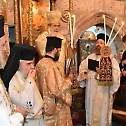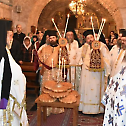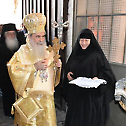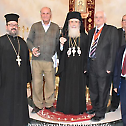The Feast of St. James the Brother of God at the Patriarchate
On Monday, October 23/ November 5, 2018, the Patriarchate celebrated the commemoration of St. James the Brother of God at the Cathedral bearing his name, which lies between the Hagiotaphite Brotherhood Headquarters and the Church of the Holy Sepulchre, and also serves as an internal passage between them.
The Church celebrates this glorious Saint as the Brother of God, namely the brother of our Lord in the flesh, because he was Joseph’s son in the flesh, who according to the law was considered to be the father of our Lord Jesus Christ and Theotokos’ fiancé.
The Church also celebrates St. James as the first Bishop of the Church of Jerusalem, as the writer of one epistle in the New Testament, as the Chairman of the Apostolic Synod in 49 A.D. and as a righteous man, murdered by the Jews because he was preaching that Jesus is the Christ.
The feast was officiated in both Vespers in the evening and in the Divine Liturgy in the morning by His Beatitude our Father and Patriarch of Jerusalem Theophilos, with co-celebrants the Most Reverend Archbishop Aristarchos of Constantina, the Most Reverend Archbishop Philoumenos of Pella and the Most Reverend Metropolitan Joachim of Helenoupolis, Hagiotaphite Hieromonks, Arab-speaking Priests, the ministering Priest of the Cathedral Fr. Farah Bandour, Archdeacon Mark and Deacon Hader.
After the Divine Liturgy, His Beatitude returned to the Patriarchate Headquarters fully clad in His Patriarchal Liturgical vestments and escorted by the Hagiotaphite Fathers. The procession went via the Monastery gate where everybody received the traditional small loaf of bread by the responsible for the bakery, Nun Seraphima.
At the Patriarchate Reception Hall there was a special prayer and after the wishes for many happy returns, His Beatitude addressed those present as follows;
“The righteous shall inherit the land, and dwell therein forever” (Psalm 37:29) the psalmist proclaims.
Beloved Brothers and Sisters in Christ,
Noble Christians and Pilgrims,
We have come in this sacred Church in gleefulness today, in order to honour the commemoration of the Holy Martyr and Apostle James the Brother of God and First Hierarch of the Church of Jerusalem.
Being righteous, St. James became the heir of the sacred land of Palestine and through his successors, namely the Bishops and Patriarchs of the Church of Jerusalem, he became its eternal inhabitant, “forever and ever”.
His apostolic ministry as the first Hierarch of the Church of Jerusalem and as a permanent dweller in the Holy Land throughout the ages, was sealed by his martyr’s blood for the love of Christ. Moreover, the salvific preaching of the incarnation of God the Word, Jesus Christ, is witnessed by the God-inspired epistle, written by St. James, the content and teaching of which has as a source and a peak the temptations and patience.
“My brethren, count it all joy when ye fall into divers temptations; Knowing this, that the trying of your faith worketh patience” (James 1:2-3) St. James writes. And in more detail; you will rejoice in these sorrows and temptations, when you have the knowledge that the testing of your faith through sorrows, creates as a result a patience that is safe, complete and steadfast.
Interpreting these words, St. Ecumenios says; “It is not without trials by both the world and God that we become worthy of the crowns of glory”. In extension of this interpretation he quotes the words from the wisdom of Sirach: “My child, if you aspire to serve the Lord, prepare yourself for an ordeal” (Wisdom of Sirach 2:1). He also adds the Lord’s words: “In the world ye shall have tribulation: but be of good cheer; I have overcome the world” (John 16:33). And; “strait is the gate, and narrow is the way, which leadeth unto life” (Math. 7:14).
According to St. James, faith should not be confined only to its “trial”, namely the sorrow and patience, but also to performing good and God-pleasing works; “What doth it profit, my brethren, though a man say he hath faith, and have not works? Can faith save him?” (James 2:14).
Commenting on these words, St. John Chrysostom says; “[St. James] named faith after work. Therefore, the fact that you have believed and have surrounded your faith with works, does not mean that faith lacks works, but [on the contrary] faith itself is full of good works. The works come from people and are directed to people, while faith comes from people and is directed to God. And while faith should be completed with works, it is necessary to be clad in faith before works are performed”.
In other words, my dear Brothers, works are those which vivify faith. And this is so, because, just as the body without the soul is dead, likewise faith without works of virtue is not a living faith, but a dead one, as St. James teaches; “For as the body without the spirit is dead, so faith without works is dead also” (James 2:26).
St. James, who talks about prestige and authority throughout his epistle, was considered to have been “the pillar of the church” according to St. Paul’s witness in his letter to Galatians (Gal. 2:9).
Undoubtedly, St. James the Brother of God remains “the pillar” and “the founding stone” of the Church and especially of the Church of Jerusalem, because he became communicant of Christ’s martyrdom on the Cross, namely of His redeeming blood, on which the founding stone of the Church was placed.
In other words, St. James is the founding stone of the sacred institution of the Apostolic Succession which was set by our Lord and Saviour Jesus Christ, as St. Paul says; “And God hath set some in the church, first apostles…” (1 Cor. 12:28). And the immediate successors of the apostles are the Heads of our Orthodox Churches all over the world.
This means that the institution of the “Apostolic Succession” is the guarantee of the safeguarding of the natural and spiritual borders within which the mystical body of Christ, that is the Church, lives and exists. “He is the head of the body of the Church” (Col. 1:18) St. Paul preaches.
Our contemporary St. Porphyrios says; “we are true Christians, when we feel deep inside that we are members of the mystical body of Christ, of the Church, in a continuous relationship of love; when we live in union with Christ, namely, when we feel the unity in His Church, feeling that we are one. For this reason Christ prays to His Father saying “that they may be one” (John 17:11-12). This is the deepest meaning the Church holds. This is where the mystery lies; that all people may be united as if they were one person in God”.
The institution of the Apostolic Succession is vivified through the Holy Spirit which is active in the liturgical life of the Church, in the sacrament of the Holy Eucharist. For this reason St. James urges the faithful to pray. “Pray one for another, that ye may be healed. The effectual fervent prayer of a righteous man availeth much” (James 5:16). As proof of the power of prayer, St. James sets Prophet Elias as an example, saying; “Elias was a man subject to like passions as we are, and he prayed earnestly that it might not rain: and it rained not on the earth by the space of three years and six months” (James 5:17).
Let us who honour St. James commemoration today and hearken to his words: “The effectual fervent prayer of a righteous man availeth much” (James 5:16), entreat him and along with the hymn writer say: “Thou didst set forth the law of life for the Church of Christ, ordaining and proclaiming it in the life-creating Spirit. Intercede with Christ our God that forgiveness of our transgressions may be granted to us, and His peace will be sent forth to the Churches. Amen.
Source: Patriarchate of Jerusalem










